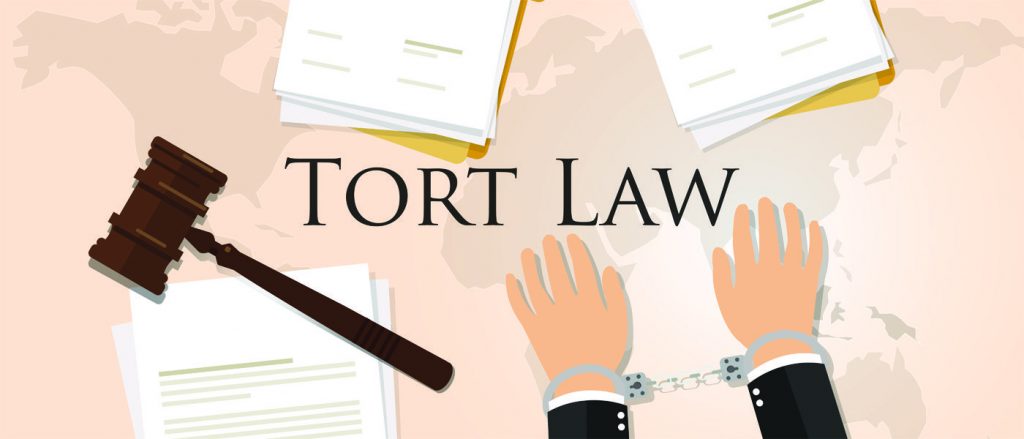
The word ‘tort‘ has been derived from the Latin term ‘tortum‘, which means ‘to twist’. It basically refers to the conduct, which is not upright or lawful. Tort is a Civil Wrong.
In short, tort consists of wrongful acts in which the wrongdoer violates some legal rights of another person. When a legal right gets breached it is known as a wrongful act.
Example
If someone publishes any derogatory information about anyone then they can file
a suit of Defamation on them. This comes under tort.
There are two kinds of WRONG–
- Civil Wrong
- Breach of Contract
- Breach of Trust
- Tort
- Criminal Wrong
So, if any wrong is committed we need to understand if it is civil or criminal wrong. If civil then we should check if it is a breach of contract or breach of trust. If it is neither of them, then it is a tort. Therefore, we can say that-
- The tort has unliquidated damages.
- It is not a Breach of Trust or Breach of Contract.
Essential Elements of Torts
Tort = Wrongful Act + Legal Damage
Wrongful Act
The act should be wrongful in nature. It means the person must have done something which he ought not to have done or he must have omitted to do that which he ought to have done.
Legal Damage
Legal damage means the violation of any legal right. To prove the wrong of tort there must be a violation of legal right.
Basic
Concepts of Tort
Two most important concepts of Tort are –
- Injuria Sine Damnum; and
- Damnum Sine Injuria.
The meaning of these terms are-
- Injuria = Injury (Legal right)
- Sine = Without
- Damnum = Damages (Physical/ Monetary)
By understanding the meaning of these terms individually, the concept can be easily understood.
- Injuria
Sine Damnum
It means Injury without damages. This means there is a violation of legal rights but no damage to the plaintiff. It simply means there is no loss or damages to the plaintiff only his legal rights get infringed.
Case Law
Bhim Singh vs. State of Jammu and Kashmir
Bhim Singh
(plaintiff) was an MLA of J&K Assembly. The plaintiff was wrongly arrested
and detained by police while he was going to Assembly. Further, he was not
produced before the Magistrate. This act didn’t physically or monetarily damage
him but his legal and fundamental rights were violated. The State was held
liable and asked to pay damages.
This is a case of tort.
- Damnum
Sine Injuria
It means damages without injury. In short, there are damages done to the plaintiff. They might be physical or monetary but no legal rights are infringed.
Case Law
Gloucester Grammar School
In this case, the defendant set up a school in the same locality in which the plaintiff’s school was located. The defendant even reduced the fees of the school. This not a case of tort as there was only monetary loss to the plaintiff and none of his legal rights were violated.
Motive
The motive is irrelevant in tort. But many times motive finds its way in CLAT exam papers so as to confuse the examinee.
Facts:
There was an established school Anand in a particular locality. Subsequently, a new school Binod was set up in the same locality, which charged lower fees, on account of which people started patronizing the new school. Because of the competition, Anand had to reduce its fees. Anand filed a case against Binod saying that Binod had caused Anand financial loss and thus, claimed compensation.
Which of the following derivation is correct?
a) Since no legal rights of Anand had been violated, therefore as such no compensation could be granted.
b) Since damages are caused to Anand, therefore, compensation should be awarded.
c) Anand should be awarded compensation as the opening of school in the competition is not good.
d) No compensation could be granted a reduction in fees is good for the public.
Answer – Option A
Facts:
Armaan was a qualified voter for Lok Sabha election. However, a returning officer wrongfully declined to take Armaan’s vote. In spite of such wrongful refusal, the candidate for whom ‘Armaan’ wanted to vote won the election. But, ‘Armaan’ brought an action for damages.
a) Since no legal right of Armaan has been violated, therefore as such, no compensation could be granted.
b) Since the legal right of Armaan had been violated, therefore compensation should be granted.
c) No compensation could be granted as Armaan had suffered no loss as his candidate won the election.
d) Since no Fundamental right of Armaan had been violated therefore as such no compensation could be granted.
Answer – Option A